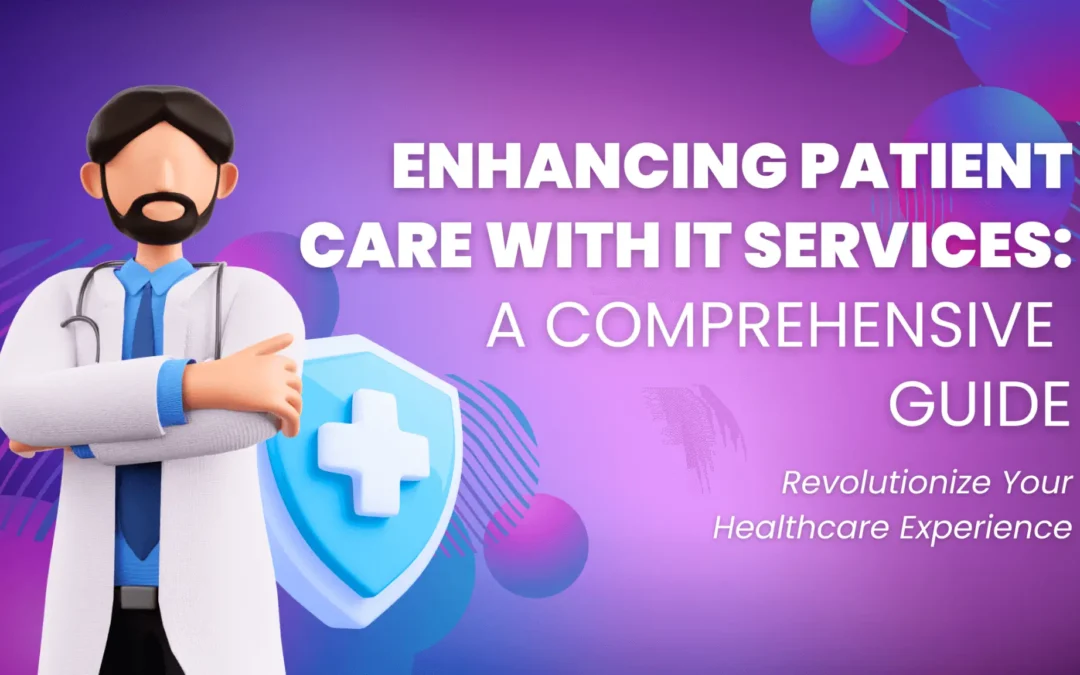Introduction
In the rapidly evolving healthcare landscape, numerous organizations grapple with integrating and optimizing various Information Technology (IT) services. The shift towards a more digital healthcare environment introduces complex challenges, from ensuring seamless interoperability of electronic health records to safeguarding patient data against cybersecurity threats. Technical teams, navigating this paradigm shift, require expertise in managing diverse IT solutions, streamlining networks, and securing sensitive healthcare information.
Streamlined Electronic Health Records
Healthcare providers revolutionized the industry by digitizing patient information through Electronic Health Records (EHRs), making it easily accessible. Healthcare IT Services streamline EHRs for efficient data management, reducing errors associated with paper records and facilitating faster decision-making. Digital Transformation involves integrating EHRs with billing, scheduling, and prescription management systems, creating a seamless workflow.
Streamlined EHRs facilitate improved coordination among healthcare providers involved in a patient’s care. For instance, a primary care physician seamlessly accesses specialist notes, lab results, and medication history, culminating in more informed diagnoses. This amplifies the quality of care and significantly boosts patient satisfaction. Additionally, EHRs play a crucial role in contributing to research and population health efforts by providing valuable anonymized data.
Telemedicine: Bridging the Gap
Telemedicine stands as a pivotal component of modern healthcare, particularly within the context of Digital Transformation. It uses technology to provide remote healthcare services, bridging the gap between patients and healthcare providers. Through Healthcare IT Services, telemedicine platforms are developed and integrated, allowing video consultations, remote monitoring, and virtual follow-ups. This enhances access to care, especially for those in remote areas, and reduces the burden on physical healthcare facilities.
Telemedicine plays a critical role in managing chronic conditions. Patients receive regular check-ins and monitoring without frequent in-person visits, leading to better compliance and improved health outcomes. During public health emergencies like the COVID-19 pandemic, telemedicine proved invaluable, ensuring patients received necessary care while minimizing exposure risks.
Precision Medicine: Tailored Treatments
A significant healthcare advancement is the shift towards precision medicine, tailoring treatments to individual patients based on their unique factors. Healthcare IT Services enable precision medicine by providing tools for genetic testing, data analysis, and treatment planning. This customization leads to more effective treatments with fewer side effects.
Digital Transformation in precision medicine allows the integration of large-scale genomic and clinical data, identifying therapeutic targets and developing targeted therapies. This has the potential to revolutionize disease treatment, empowering patients and providing a deeper understanding of their health and treatment options.
Predictive Analytics: Anticipating Needs

Predictive analytics leverages data and advanced algorithms to forecast future patient outcomes, enabling proactive and preventative care. Through Healthcare IT Services, predictive analytics models are developed to analyze patient data, identify patterns, and predict potential health issues, allowing early intervention.
The digitization of predictive analytics integrates diverse data sources, providing a holistic view of a patient’s health and lifestyle. This is particularly beneficial in managing chronic conditions and population health, allowing for targeted interventions based on risk assessments.
Cybersecurity: Safeguarding Patient Information
In the era of digital healthcare, safeguarding patient information is paramount. Healthcare IT Services focus on implementing robust security protocols, encryption techniques, and regular security audits to ensure the confidentiality and integrity of patient information.
Digital Transformation in cybersecurity involves adopting advanced technologies like artificial intelligence and machine learning to detect and respond to potential threats in real time. Training healthcare staff on cybersecurity best practices and conducting regular security awareness programs are essential to a comprehensive cybersecurity strategy.
IoT Devices and Wearables: Empowering Patients
The proliferation of IoT devices and wearables has revolutionized patient care, collecting real-time health data. Through Healthcare IT Services, these devices are integrated into the healthcare ecosystem, enabling seamless data transmission and analysis. This empowers patients to monitor vital signs, activity levels, and other health metrics from the comfort of their homes.
Digital Transformation in IoT devices and wearable technologies extends beyond individual patient care, enabling remote monitoring of chronic conditions and providing aggregated data for population health management and clinical research.
Seamless Interoperability: Enhancing Collaboration
Interoperability in healthcare refers to the ability of different systems and software to communicate and exchange data seamlessly. Through Healthcare IT Services, efforts are made to ensure various healthcare systems share information efficiently. This allows for better coordination among healthcare providers, leading to more comprehensive and integrated treatment plans.
Digital Transformation in interoperability extends to exchanging information between different healthcare facilities and organizations. This is crucial for patients seeking care from multiple providers or institutions, reducing duplication of tests and procedures while enhancing the overall quality of care.
Patient Engagement Platforms: Fostering Communication
Patient engagement platforms leverage technology to facilitate communication and interaction between patients and healthcare providers. Through Healthcare IT Services, these platforms provide easy access to health information, appointment scheduling, medication reminders, and secure messaging with healthcare teams. This fosters a more active and informed role for patients in managing their health.
The application of digital transformation in patient engagement platforms goes beyond basic communication, integrating educational resources, wellness programs, and personalized health recommendations based on individual patient data. This empowers patients to make informed decisions about their health and promotes preventive care measures.
Conclusion
The digital transformation of healthcare through IT services offers a multifaceted approach to enhance patient care. From streamlined Electronic Health Records and telemedicine to precision medicine, predictive analytics, cybersecurity, IoT devices, seamless interoperability, and patient engagement platforms, the comprehensive integration of IT services lays the foundation for a future-ready healthcare industry. M247 stands ready to assist healthcare organizations in navigating these complexities, ensuring optimized IT infrastructure and strategies aligned with evolving healthcare technology needs.
M247 acknowledges the unique challenges faced by healthcare organizations in the era of digital transformation. Our expert consultants specialize in crafting tailored strategies to empower your technical teams to achieve more with less. Through a comprehensive analysis of your existing IT infrastructure, workflows, and security measures, we identify areas for improvement and optimization. Our Business Consulting services are designed to streamline processes, enhance efficiency, and align your IT strategy with the evolving needs of the healthcare industry.
Leveraging extensive industry knowledge, we address current challenges and anticipate future trends to ensure your organization is well-prepared for the ever-evolving healthcare technology landscape. Partnering with M247 means gaining a strategic ally committed to maximizing the impact of IT services on patient outcomes, and providing cost-effective solutions for sustainable success.
→ Ready to unlock the full potential of your IT infrastructure? Elevate your business with expert IT services! Schedule a free consultation with us, and let’s chart your path to digital success!
Read more articles on M247.net/blog

